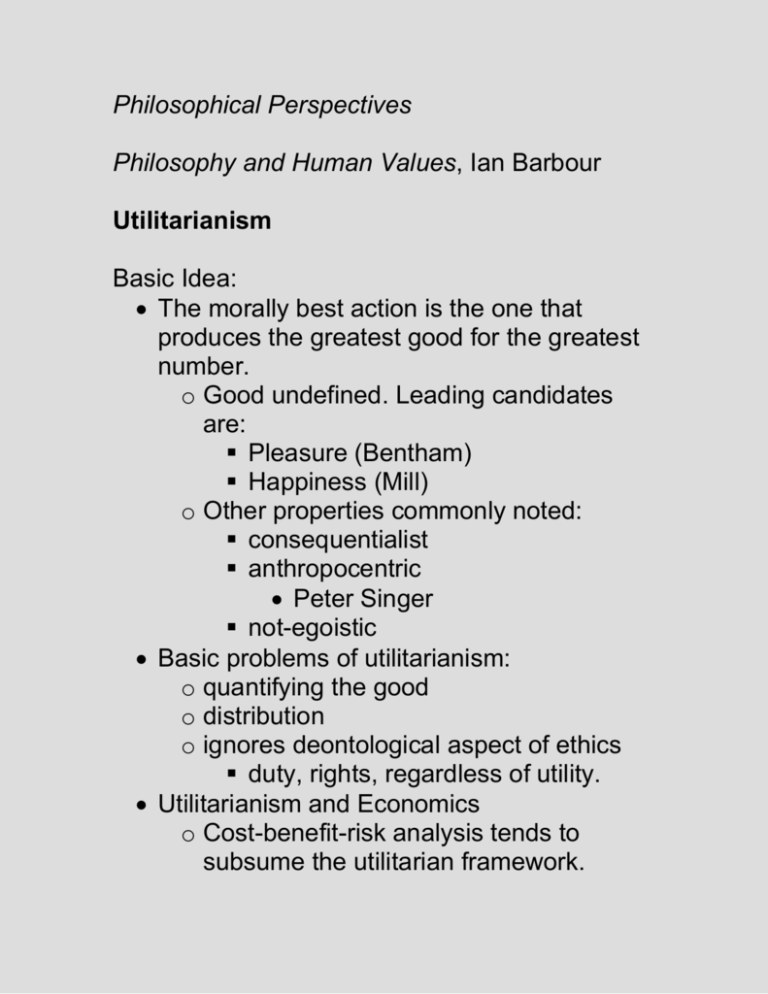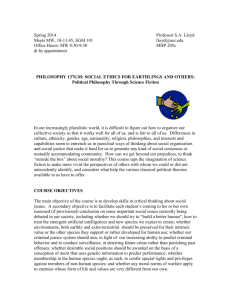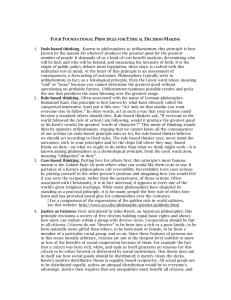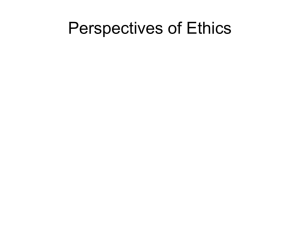Historical Perspectives
advertisement

Philosophical Perspectives Philosophy and Human Values, Ian Barbour Utilitarianism Basic Idea: The morally best action is the one that produces the greatest good for the greatest number. o Good undefined. Leading candidates are: Pleasure (Bentham) Happiness (Mill) o Other properties commonly noted: consequentialist anthropocentric Peter Singer not-egoistic Basic problems of utilitarianism: o quantifying the good o distribution o ignores deontological aspect of ethics duty, rights, regardless of utility. Utilitarianism and Economics o Cost-benefit-risk analysis tends to subsume the utilitarian framework. Justice Basic idea: Equality of individual persons. Utilitarianism incorporates equality in that it is normally understood to count the good of individuals as being of equal merit; o i.e., my happiness does not count more than yours. Utilitarianism is normally understood to violate justice in that it permits people or goods to be sacrificed for the greater good. Rawls theory of justice: Original Position argument. Rawls principles (p.116) 1. Each person is to have an equal right to the most extensive total system of equal basic liberties compatible with a similar system of liberty for all. 2. Social and economic inequalities must be: to the greatest benefit of the least advantaged. attached to positions open to everyone. Properties: Principle 1 is consistent with a utilitarian outlook, but principle 2 rejects utilitarianism. Standard Criticisms: Assumes too high a degree of risk aversion. Places too much/too little emphasis on economic equality. Freedom Negative and positive aspects Negative: Freedom from interference, absence of external restraints. Positive: Freedom to pursue ones goals, presence of opportunities. Forms of freedom: 1. Free participation in the marketplace. Problems: leads to significant economic inequality. 2. Participation in the political process: Problems: leads to significant inequality with respect to political influence. 3. Participation in work-related decisions: Problems: Unions can protect vested workers but harm hiring, innovation and improvement. Technology and Responsibility, Hans Jonas Basic Idea: The ethical systems of pre-20th century humans all tended to assume that: knowledge of right and wrong is available to everyone; moral relationships are mostly local; humans have a minimal and morally insignificant impact on the non human environment. Jonas thinks that modern technology has changed all this: Nature is now vulnerable to human activity. Examples of environmental damage: Pollution Deforestation Global climate change Elimination of biodiversity. Issues: Nature of moral relationship to nature: o Are these issues all ultimately about human thriving? Nature of epistemic and practical relationship: o Predictive knowledge of impact of technology lags behind technical knowledge (techne) of how to create technology. Kant’s Categorical Imperative Kant believed that moral knowledge was a matter of just making sense. The CI counsel us to: Act so that you can will that the maxim of our action be made the principle of a universal law. The basic idea here is just that if we reflect on the principle that we are using to justify our action and imagine it in it’s most general form, as applied to everyone, we can determine it’s moral significance. When your mother asks: How would you like it if someone did that to you? she had a mixture of Kantian and egoistic concerns going. Kant doesn’t really care how you would like it; rather, he asks whether it is possible to conceive or to will a world based on that principle. If not, then the action is wrong. Jonas’ point regarding Kant Jonas’ point is just that it is no longer plausible to think that the moral significance of an action can be determined simply by reflection. There are too many fundamentally empirical issues at stake, issues that often remain well beyond the ken of science itself. Examples: Should we be spending more money on AIDS research? Should the U.S. attempt to establish democracies in non-democratic countries? Should there be a law against talking while driving on the cell phone? Should file sharing of purchased music be illegal? The answers to these questions all depend on fundamentally empirical matters, i.e., the ultimate effects of engaging in these actions. Important distinction to always bear in mind: Empirical claims: These simply describe the state of the world. o E.g., The average temperature of the earth is rising due to increasing green house emissions. Normative claims: Concern the value of states of the world. o Global warming is bad. Jonas point can be most easily summarized as pointing out that the answers to most moral issues raised by technology lie in the answer to empirical questions, not normative questions. Technology and Social Justice, Freeman Dyson Video Technological Subversion, David Strong The argument proposed in this article is much simpler than it appears: 1. The primary purpose of technology is to relieve us of burdens, i.e., to make life easier. 2. Some or our burdens are what make life meaningful. 3. Hence, technology has the effect of making life less meaningful. Articulation: Distinction between “things” and “devices”. Our things require involvement and work, and, as such, become the focus of a great deal of social cooperation. Devices require only the flipping of switches. Their ease of use eliminates the social benefits. Examples: Hearth vs. central heating Musical instruments vs. ipods Internet vs. bus Ironic Consequences Disburdening people of inconveniences make them less socially engaged, more isolated from each other. Disburdening people of inconveniences makes them more likely to do less productive things, viz., watch TV. Basic idea: People actually place greater value on experiences that require a great deal of effort, but people are generally lazy, and will usually opt for an activity that requires less of them if given a choice. Question: Are these claims generally true? If so, are they significant objections to the creation of technology, or are there technological fixes for problems like these?











